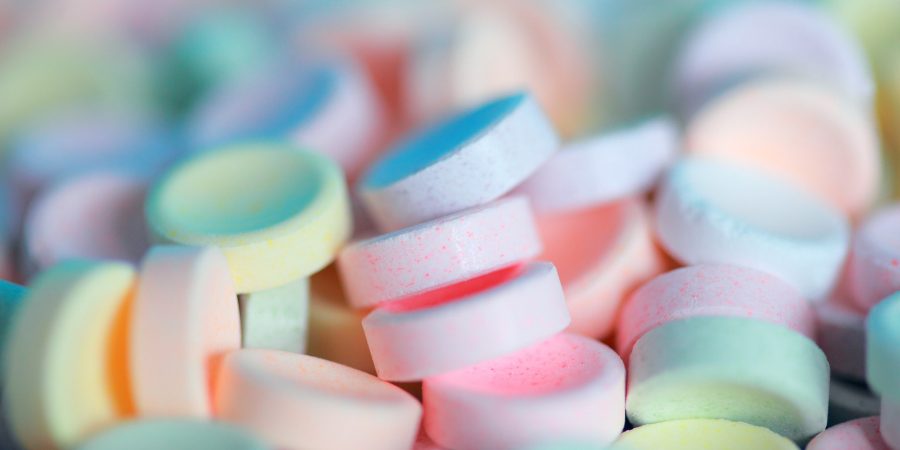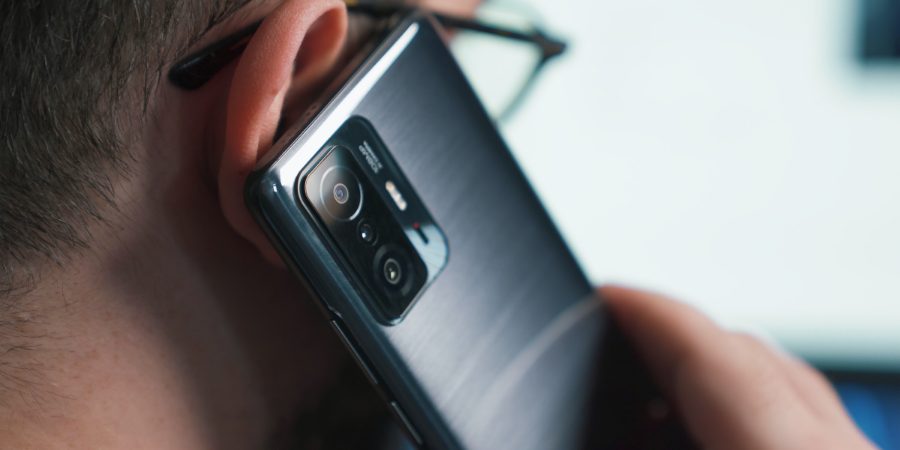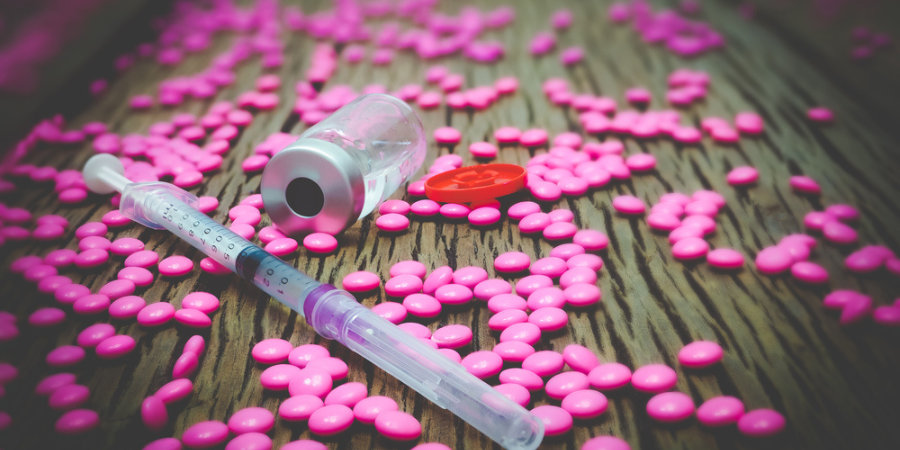
Written by:

Medically Reviewed by:
Last Updated:
October 13th, 2025
Ecstasy addiction
What is Ecstasy?
Ecstasy, also known as MDMA, is a synthetic drug that changes how the brain regulates mood and perception. Once taken, it increases the activity of serotonin and dopamine, which alter emotional states and creates a stronger sense of stimulation. The rise in these chemicals explains why people often describe a lift in mood and a heightened sense of connection.
Because of these effects, Ecstasy is often associated with places where people gather in large groups. Festivals and nightclubs are two of the most common environments, as the drug’s ability to enhance energy and emotions fits the atmosphere of these settings.
In the UK, Ecstasy is classified as a Class A substance under the Misuse of Drugs Act, which carries some of the toughest penalties. Possession can lead to up to seven years in prison, an unlimited fine or both, while supplying it can result in a life sentence.
Is Ecstasy addictive?
Ecstasy is not seen as addictive in the same way as heroin or cocaine, but that does not mean it is without risk. The danger lies in psychological dependence, which builds around cravings for the emotional highs and feelings of connection that Ecstasy can produce. When those cravings begin to shape behaviour, the drug can become difficult to step away from, especially if it is a regular feature of social life.
Tolerance also develops over time, so the same amount no longer produces the same effects, and larger doses feel necessary. What begins as occasional use can slowly shift into a pattern that is harder to control. The comedowns also then make things worse, with feelings of sadness, irritability and anxiety arriving once the drug wears off. This makes the temptation to take it or perhaps another drug, again, grow stronger.
This type of back-and-forth between highs and lows is what makes the cycle of dependency difficult to break.
What the evidence says
Evidence points to psychological effects as the main driver of Ecstasy dependence. The lack of severe physical withdrawal symptoms sometimes creates the impression that the drug is safe, but research shows otherwise.
- Regular users often report tolerance, which pushes them to use more frequently.
- Stopping use can bring withdrawal-like symptoms such as fatigue, low mood and irritability.
- Clinical reports show that some people meet the criteria for Ecstasy dependence.
These findings highlight that while Ecstasy may not cause strong physical addiction, the psychological risks remain significant.
Example scenarios: how someone might fall into Ecstasy dependence
Understanding the pull of Ecstasy addiction is not always straightforward when it is explained in writing. It may seem confusing that one person can use the drug occasionally without problems while another begins to rely on it more heavily. To show how this difference can happen, here are some theoretical scenarios where Ecstasy addiction could develop.
|
Scenario |
How dependency might develop |
| Uni socialiser | Anna attends parties and uses Ecstasy with friends. Over time, she notices that the events feel flat without it and the link between her social life and the drug becomes stronger, leading to more frequent use. |
| Emotional escape route | Ben feels isolated and anxious and at a festival, Ecstasy makes him feel deeply connected to others. When he returns to normal life, the emptiness is hard to bear, so he soon plans his weekends around taking the drug again. |
| Tolerance-driven escalation | Clara starts with small doses but these gradually lose their effect. She increases the amount she takes, which makes the comedowns worse, yet she continues using because avoiding the lows feels easier than facing them. |
| Self-medication in depression | David lives with untreated depression and finds that Ecstasy lifts his mood for a while. Before long, he begins relying on the drug to get through daily life and it becomes his main way of coping. |
These examples show how different circumstances can lead to the same outcome, as each person gradually becomes caught in a cycle of psychological dependence.
Ecstasy in the UK
When we look at Ecstasy in the UK today, the numbers tell a clear story of decline compared to earlier years.
According to the Crime Survey for England and Wales, just 0.7% of adults aged 16–59 reported using Ecstasy in the year ending June 2022. That figure rose slightly to 1.1% in 2023 and 1.2% in 2024, but these levels are still well below pre-2020 rates.
Among younger adults aged 16–24, use was measured at 2.4% in 2023 and 2.2% in 2024, showing that even in the age group most associated with nightlife and club culture, prevalence remains modest.
Despite these low usage rates, there are signs of fluctuation in consumption. A fascinating Home Office wastewater study suggested MDMA intake increased by more than half between early 2023 and early 2024. While this does not mean more people are using Ecstasy, it points to changes in how much is being taken by those who do.
Overall, the UK picture is one of limited but persistent use. Ecstasy is less common than other drugs, yet its presence in both survey data and treatment services shows it continues to play a role in the country’s drug scene.
Is Ecstasy addiction dangerous?
Because we do not hear about people dying from Ecstasy addiction as often as we do with alcohol or heroin, many assume it is not possible.
The truth is that being dependent on Ecstasy puts you in a dangerous position, not always because of the addiction itself but because of how unpredictable and harmful the substance can be. People often forget just how risky the drug is, especially when bought through the illicit market, where there is little control over what ends up in each pill.
Another danger comes from the way Ecstasy increases thirst while preventing the body from releasing fluids properly. This combination has led to tragic cases of water intoxication, where people drink large amounts of water in a short time and suffer fatal swelling of the brain.
Leah Betts is perhaps the most well-known example of this in the UK, having died after drinking around seven litres of water in less than two hours following a single pill.
Pills circulating in the UK today are often far stronger than those of the past, with some tested at over four times the dose people might expect. Such strength can overwhelm the body, even if the user thinks they are pacing themselves.
To make matters worse, there is no guarantee that what is being sold as Ecstasy contains only MDMA. Many tablets have been found cut with other stimulants or dangerous substitutes like PMA, which metabolises slowly and has been linked to deaths across the country. This means that the more frequently someone uses, the greater the chance they will eventually take a pill that proves too strong or contains something unexpected.
Surveys in the UK have shown that regular Ecstasy users are much more likely to try cocaine or amphetamines compared to those who have never touched the drug. In this way, dependency on Ecstasy can gradually draw people deeper into the wider drug scene, creating new problems beyond the pill itself.
The Office for National Statistics reported 67 MDMA-related deaths in 2022, rising to 79 in 2023, which represents a sharp increase in a single year. While these figures may sound small next to alcohol or opioid deaths, they reflect the very real risks that come with what many see as a casual party drug.
Taking all of these factors into account, it becomes clear why recognising the signs of an Ecstasy addiction in yourself or someone close to you is so important. Early awareness allows for quicker action, and in the next section, we look more closely at what those signs are.
What are the signs of Ecstasy addiction?
Recognising the signs of Ecstasy addiction is important, particularly if you or someone close to you is using the drug often. Ecstasy is commonly associated with nightlife and festivals, but frequent use can spill over into everyday life and start causing real problems. Understanding the warning signals allows you to act before things worsen.
- Trouble sleeping or changes in sleeping patterns
- Jaw clenching or grinding teeth, even when not using
- Unexplained weight changes or loss of appetite
- Regular fatigue after nights of use
- Increased tolerance, needing more to feel the same effects
- Struggling with memory or concentration
- Low mood or irritability in the days after use
- Anxiety that worsens without the drug
- Preoccupation with planning the next experience
- Loss of interest in other sources of enjoyment
- Using Ecstasy in risky or inappropriate situations
- Missing work, studies or responsibilities due to comedowns
- Hiding use from friends or family
- Spending large amounts of money on the drug
- Continuing use despite health or relationship problems
If you recognise some of these signs in yourself or someone close to you, it may be time to pause and reflect on your relationship with Ecstasy. In the next section, we’ll guide you through a short self-questionnaire to help you check in more closely.
Do I have an Ecstasy addiction?
If you have noticed some of the signs above, there is no harm in checking in with yourself and taking stock of your relationship with Ecstasy. The questions below are not a diagnosis, but can help you reflect honestly.
- Do you feel the need to take Ecstasy more often than before?
- Have you tried to stop but found it difficult?
- Do you crave Ecstasy or think about it regularly?
- Has it begun to interfere with work, studies or relationships?
- Do you continue using it even after negative effects?
- Have you withdrawn from activities or people because of Ecstasy?
Answering yes to one or two of these may be a sign that professional guidance could help.
Where can I get help for an Ecstasy addiction?
If you or someone close to you has reached the point where Ecstasy use feels unmanageable, it is important to know that help is available. At UKAT, we provide support for people facing Ecstasy addiction, beginning with an assessment to understand your situation. Ecstasy detox and therapy through ecstasy rehab are available in a safe setting, followed by aftercare to support long-term recovery.
The most important step is reaching out. A simple conversation with our team can give you clarity about treatment options and what the next step should be. Getting help now can prevent the situation from becoming more difficult later.
Frequently Asked Questions
(Click here to see works cited)
- Mustafa, Nor Suliana, and Nasir Mohamad. “MDMA and the Brain: A Short Review on the Role of Neurotransmitters in the Cause of Neurotoxicity.” Basic and Clinical Neuroscience Journal, vol. 11, no. 4, Nov. 2019, https://doi.org/10.32598/bcn.9.10.485
- Degenhardt, Louisa, et al. “Is Ecstasy a Drug of Dependence?” Drug and Alcohol Dependence, vol. 107, no. 1, Feb. 2010, pp. 1–10, https://doi.org/10.1016/j.drugalcdep.2009.09.009.
- Jansen, K. “Ecstasy (MDMA) Dependence.” Drug and Alcohol Dependence, vol. 53, no. 2, Jan. 1999, pp. 121–24, https://doi.org/10.1016/s0376-8716(98)00111-2
- Office for National Statistics. “Drug Misuse in England and Wales: Year Ending June 2022.” Www.ons.gov.uk, edited by Pete Jones, 15 Dec. 2022, www.ons.gov.uk/peoplepopulationandcommunity/crimeandjustice/articles/drugmisuseinenglandandwales/yearendingjune2022
- Office for National Statistics. “Drug Misuse in England and Wales – Office for National Statistics.” Office for National Statistics, Office for National Statistics, 2023, www.ons.gov.uk/peoplepopulationandcommunity/crimeandjustice/articles/drugmisuseinenglandandwales/yearendingmarch2023
- ONS. “Drug Misuse in England and Wales: Year Ending March 2024.” Ons.gov.uk, Office for National Statistics, 12 Dec. 2024, www.ons.gov.uk/peoplepopulationandcommunity/crimeandjustice/articles/drugmisuseinenglandandwales/yearendingmarch2024
- Office, Home. “Wastewater Analysis: Measuring Illicit Drug Consumption in 2023 and 2024.” GOV.UK, 17 Mar. 2025, www.gov.uk/government/publications/wastewater-analysis-measuring-illicit-drug-consumption/wastewater-analysis-measuring-illicit-drug-consumption-in-2023-and-2024
- Figurasin, Rick, and Nicole J. Maguire. “3,4-Methylenedioxy-Methamphetamine (MDMA, Ecstasy, Molly) Toxicity.” PubMed, StatPearls Publishing, 2020, www.ncbi.nlm.nih.gov/books/NBK538482/
- FALLON, J. K., et al. “Action of MDMA (Ecstasy) and Its Metabolites on Arginine Vasopressin Release.” Annals of the New York Academy of Sciences, vol. 965, no. 1, Jan. 2006, pp. 399–409, https://doi.org/10.1111/j.1749-6632.2002.tb04181.x
- “Party Pills: Potent Drugs Disguised as Ecstasy Are Taking over the Streets – Drug and Alcohol Information and Support in Ireland – Drugs.ie.” Drugs.ie, 2025, www.drugs.ie/news/article/party_pills_potent_drugs_disguised_as_Ecstasy_are_taking_over_the_streets Accessed 30 Sept. 2025
- Hillier, David. “6 New Drug Death Trends—and What They Say about Modern Britain.” VICE, 23 Oct. 2024, www.vice.com/en/article/6-new-drug-death-trends-and-what-they-tell-us-about-modern-britain/
- “2022 Update on MDMA – Drug and Alcohol Information and Support in Ireland – Drugs.ie.” Www.drugs.ie, www.drugs.ie/september_2021_update_on_mdma_contents_in_europe/
- https://newatlas.com/author/loz-blain. “Major UK Study Examines the Long-Term Effects of Ecstasy Use.” New Atlas, 13 Feb. 2009, newatlas.com/study-effects-Ecstasy/10995/ Accessed 30 Sept. 2025.
- Mussen, Maddy. “‘It’s a Potentially Fatal Dose’: The Superstrong Ecstasy Pills Taking over London amid Drug Deaths.” The Standard, Evening Standard, 21 Dec. 2024, www.standard.co.uk/lifestyle/mdma-drug-side-effects-pill-check-report-the-loop-london-b1189678.html Accessed 30 Sept. 2025.








